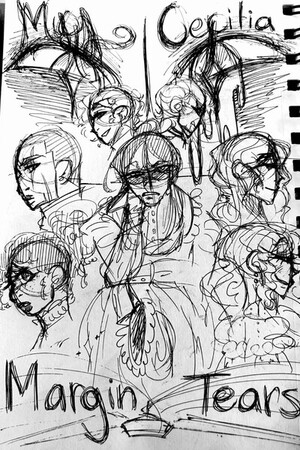Chapter 36:
Another Morning
Margin Tears: My Cecilia
Cecilia did not know when the night ended, when the next day began, or really, truly, if it was a different period of time, if it actually existed in any meaningful metric. The servants’ quarters smelled faintly of soap and damp stone, the air heavy with the residue of boiled starch and coal smoke that clung to the corridors long after nightfall. The small rooms, lined in rows like narrow coffins with doors, were meant to offer rest to the weary—yet when Cecilia stumbled back into hers, it felt less like shelter and more like a cell.
She closed the door and leaned against it, chest heaving. Her legs carried her only as far as the bed. The thin mattress dipped beneath her weight, springs groaning, and she pressed her hands into it until her nails bit through the fabric. The rough ticking cloth offered no comfort; it only reminded her how fragile everything here truly was.
The ballroom lingered in her senses. The chandeliers unraveling into stars, the marble floor stretching into miles of void, the mirrors vomiting her own memories into her face. She had felt her very self come undone, her breath stolen, her bones rattled by truths too large for flesh to contain.
And the worst of it: he had put it all back together again.
As if none of it had happened. As if reality itself were a toy for his hands.
Cecilia hunched forward, elbows on her knees, the nausea roiling inside her until she thought she might vomit onto the floorboards. The mattress creaked beneath her rigid grip, her knuckles whitening with the force she put into holding something—anything—that still felt solid. But solidness, she now understood, was a lie. The mattress could vanish. The room could dissolve. The world around her was not stone and wood, but paper and ink, and the lord’s fingers could crumple or smooth it at a whim.
Her stomach twisted. A shiver coursed through her limbs, violent enough that her teeth clicked together. She wrapped her arms around herself, clutching her own body as though to anchor it. The servants’ laughter and sighs that sometimes filtered through thin walls were absent tonight. Silence pressed in. Alone with her thoughts, she felt as fragile as a moth trapped beneath glass.
All of this was fiction—She, at this point, was fiction as well.
The realization lodged like ice in her chest. The ballroom. The chandeliers. The manor itself. Even her own life. A story written, rewritten, manipulated to suit the lord’s mood.
Her throat burned, bile rising. She squeezed her eyes shut and fought it down. The sickness was not only fear—it was grief. Faces swam before her: the other maids, the footmen, those who had vanished without explanation, written out as easily as candle flames snuffed. She had thought them victims of cruelty, yes, but of ordinary cruelty—dismissal, violence, death. She had not imagined they could have been erased, excised from the page of existence itself.
Tears pricked her eyes, but she did not let them fall. She sat frozen, staring at the floorboards until her vision blurred. Minutes, hours—time lost meaning. She clutched the mattress as if squeezing it tighter would keep her tethered.
But the silence stretched, and something began to harden beneath her fear.
She thought of the artist, who had whispered of escape. She thought of the heiress, with her strange, sharp interest in forbidden things. She thought of the others—friends, confidantes—swallowed by the house’s hunger. And she thought of herself, small and trembling now, but not broken. Not yet.
Cecilia’s body shuddered once more, then went still. She uncurled her fingers from the mattress, though they ached with the effort.
If this was all fiction, then it could be resisted.
The lord’s threats echoed in her skull—never disobey him again, or worse will follow. She tasted the warning like iron on her tongue. But alongside it, something else: defiance. He had meant to crush her, but in showing her the seams of his power, he had revealed too much. He had made her understand the stakes.
She sat upright, her breath unsteady but stronger now, her gaze fixed on the small, cracked window where a sliver of moonlight filtered through.
If everything around her was a story, then she would not allow herself to remain a character in it, doomed to suffer at his whim. She would find a way out. For herself, for the ones already lost, for the truth that should not be bent like wax beneath another’s hand.
It might cost her everything. It might mean her end. But better that than to live as a doll in his theatre.
She set her jaw, whispering to the empty room as though daring the walls to hear:
“I will be free. Even if I have to tear this story apart with my own hands.”
The mattress still sagged beneath her, but her grip had steadied. The sickness in her stomach gave way to a cold, trembling resolve.
Olrin had shown her what disobedience cost, but she would learn, too, what rebellion demanded.




Please sign in to leave a comment.